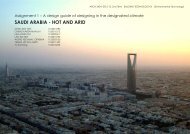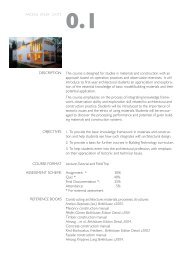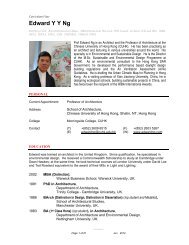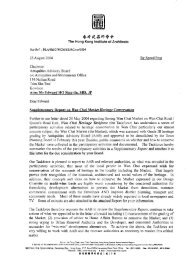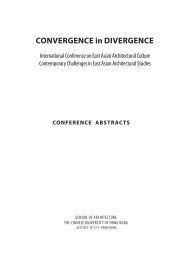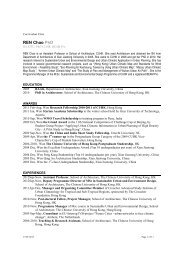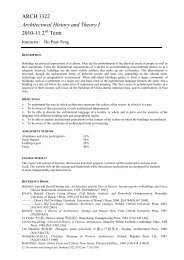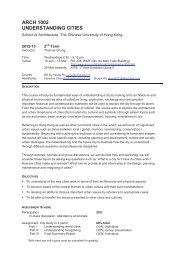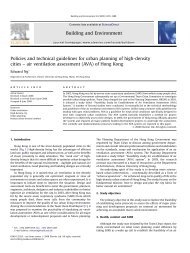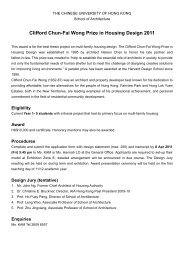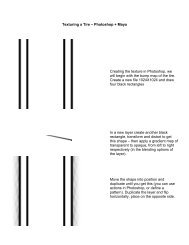Black Book - School of Architecture - The Chinese University of ...
Black Book - School of Architecture - The Chinese University of ...
Black Book - School of Architecture - The Chinese University of ...
- No tags were found...
You also want an ePaper? Increase the reach of your titles
YUMPU automatically turns print PDFs into web optimized ePapers that Google loves.
MArch+Certificate in MArch ConcentrationsMechanism<strong>The</strong> Master <strong>of</strong> <strong>Architecture</strong> Plus (MArch+) encompasses four core areas that reflect upon interests and expertises at the <strong>School</strong> <strong>of</strong><strong>Architecture</strong>: computational, conservation, sustainable, and urban design.Each area <strong>of</strong>fers required and elective courses, seminars and studios that are both specific to the area and interdisciplinary in nature.28MArch+ aims to <strong>of</strong>fer additional learning experience in one <strong>of</strong> the four areas to enhance the knowledge and abilities <strong>of</strong> students within theirpr<strong>of</strong>essional degree. Students would have a full two years to fulfill the necessary requirements without having to declare the concentration29at the outset <strong>of</strong> entering MArch programme.ConcentrationsIn addition to the requirements <strong>of</strong> the studio, required and elective courses for the fulfilment <strong>of</strong> the degree <strong>of</strong> Master <strong>of</strong> <strong>Architecture</strong>, astudent opt to take three electives <strong>of</strong>fered in one concentration and an MArch 1 or MArch 2 concentration studio in order to qualify for theaward <strong>of</strong> a certificate in that concentration. Of the 9 credits gained from concentration electives, 3 can be counted towards the 52-creditgraduation requirement <strong>of</strong> the MArch programme, except for Sustainable Design.Computational DesignCoordinator: marc aurel schnabelConservation DesignCoordinator: ho puay-pengSustainable DesignCoordinator: edward ngUrban DesignCoordinator: hendrik tiebenYou explore and deepen your knowledge and exposure in thediscipline <strong>of</strong> computational architecture and digital manufacturing.<strong>The</strong> courses are grouped around digital technologies forarchitectural design and the challenges <strong>of</strong> producing socially andenvironmentally sustainable environments. You are encouraged toreframe challenges <strong>of</strong> the built environment, to become a centralparticipant in the larger context and to implement architecturalcomputation in your designs.Heritage conservation impacts many aspects <strong>of</strong> the cultural life <strong>of</strong>the society, including historical continuum, urban landscape, andcultural regenerations. In many urban projects, architects workingare increasingly confronted with heritage building located within oradjacent to the site. This concentration is to provide a framework forunderstanding the theory and practice <strong>of</strong> heritage conservation, andskill in design with historic buildings. <strong>The</strong>re will also be an opportunityto work with expert and students in Beijing.<strong>The</strong> sustainable design concentration allows the student a better indepthunderstanding <strong>of</strong> design issues related to the topical concern <strong>of</strong>sustainable and environmental design in archiecture.Students in this concentration area can take advantage <strong>of</strong> the<strong>School</strong>’s unique location in Hong Kong and the Pearl River Deltafor in-depth studies <strong>of</strong> contemporary urban issues related torapid urban transformation and high density living. Studios andseminars explore new emerging urban forms and the underlyingprocesses <strong>of</strong> their creation. <strong>The</strong> focus in this concentration areashifts from the design <strong>of</strong> objects to places. Summer <strong>School</strong>s giveopportunities to learn in international teams and experience abroader range <strong>of</strong> urban conditions.Requirementsdesign studiosG1 cross-fabricated scales;G7 glass commmune;<strong>The</strong>siselectives arch 5701c; arch 5901design studiosG6 designing with historic buildings;<strong>The</strong>siselectives arch 5801, arch 6303, arch 6304design studio<strong>The</strong>siselectives senv 7005; senv 7200^;senv 7300^;senv 7006; senv 7400^design studiosG9 visions for macau-zhuhai’swater space;G10 1km² mega block;G11 sustainable neighborhoodfor urban china tomorrow;<strong>The</strong>sisrequirementselectives: 9 units;studios: 6-unit M1 studio or16-unit thesis withcomputational designas focusrequirementselectives: 9 units;studios: 6-unit M1 studio or16-unit thesis withconservation design asfocusrequirementselectives: 9 units;studios: 16-unit thesis withsustainable design as focusand an independentstudy/technical report^block teaching electives, i.e. 36-hour lecture courses in 9 days with assignment to be submitted 1 month laterelectives arch 5701a; arch 5701b;arch 5701c;arch 6701; arch 6702requirementselectives: 6 units;studios: 6-unit M1 studio or16-unit thesis withurban design as focus



